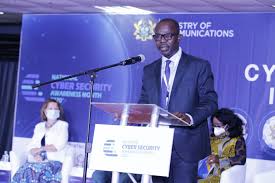Suspect Anderson Ofosuhene Ennin, aka Mario Gee
“A man who lures teenage girls into sending him their naked pictures for publication is an evil every parent must get rid of…” says Priscilla Ampaabeng, a 56 year old trader whose 14 year old daughter’s naked pictures were published on a porn website recently.
The victim, a form two Junior High School student, is the last of three children of Madam Ampaabeng, who operates a supermarket at Awoshie.
On July 12, 2020 around 10am, Madam Ampaabeng while at work received a call from an unknown caller who identified himself as Patrick Ansah calling on behalf of her daughter.
The message from Patrick was that he has nude pictures of her daughter and was demanding GH¢5,000 from Madam Ampaabeng or he will splash the pictures on social media.
The caller then sent one of the pictures to Madam Ampaabeng’s WhatsApp and warned her that the integrity of her family was in her own hands after which he hanged up.

Cynthia Mamle Morrison, Minister of Gender, Children and Social Protection
The woman did not pay attention to the statement of the caller because she thought the pictures might be photoshopped.
Two days later, she was on her way to work when one of the teachers at her daughter’s school called her on phone, informing her that he had seen some naked pictures of her daughter on pornographic websites called empressleak.com and ghdownload.com.
“The teacher then forwarded some of the pictures to my WhatsApp page. In my confused state, I also forwarded the pictures to my husband for verification since I am not so much into social media stuff,” she narrated sadly.

Ursula Owusu Ekufu, Minister of Communications
She continued that, that very day, her prayer was that it should not be her daughter.
The Truth Behind The Lies
“That evening when we questioned Maame (not victim’s real name) she told us that a gentleman she named as Boakye visited their school to sell branded T-Shirt and established acquaintance with her.”
They started communicating on telegram, a social media platform and in the process Boakye convinced the victim to send him her nude videos and photographs which she did.

Desmond Appleton and Elvin Nana Kofi Boakye Agyeman, jailed
She said at a point, Boakye’s demand for her nudes increased so she decided not to send Boakye any more pictures and that was when, suspect started threatening her.

Dr Albert Antwi- Boasiako, National Cyber Security Advisor
Maame later uninstalled the application on her mobile phone to avoid further encounter with Boakye.
“I thought my daughter was only using the mobile phone I bought for her for education purposes but unknown to me, she was on other media platforms too,” Madam Ampaabeng said sighing for breath.
“We later lodged a report to the cyber crime unit of the Criminal Investigation Department for investigation,” she said.

Dr Gustav Herbert Yankson, Director, Cyber Crime Unit, CID
Dangers On The Internet
Information and Communication Technologies (ICTs) have rapidly developed over the last two decades. Recent advances in ICTs have allowed adults, as well as children, to enjoy unprecedented opportunities and benefits in terms of socialization, education, and entertainment with loads of messages being exchanged daily.
Globally, ICT is regarded as a dependable vehicle for facilitating educational reform and development, a platform for communication, and as a means to achieve the Sustainable Development Goal Four (SDG 4).
Since the enactment of the ‘No Child Left Behind Act’ (NCLB) and declaration of the SDG 4, many countries have opted to embrace the lifelong education for all by integrating ICT in teaching and learning at all school levels.
Government’s initiative to ensure “education anytime anywhere for everyone” by revolutionizing teaching and learning through ICT has faced a lot of challenges and criticisms.
The Work Of The Cyber Crime Unit
Dr Gustav Herbert Yankson, Director in charge of the Cyber Crime Unit of the Criminal Investigation Department of the Ghana Police Service, said the unit was formed to investigate cyber related cases.
He said since its establishment, the unit has investigated several cyber crime related cases and has successfully secured justice for cybercrime victims, thus imprisoning most of the offenders.
On the issue of child online protection, Dr Yankson revealed that several of the suspects who are behind the posting of child nudes have been apprehended and others jailed.
Notable among those jailed are Desmond Appleton and Elvin Nana Kofi Boakye Agyeman who are serving a total of five years jail term for posting nude pictures of their victims online.
“We have several others currently facing the law court for such offence and the arrest of a porn blogger was a major breakthrough for us as a unit.”
What To Report To The Police
He said parents must do their part to protect their children by reporting to the unit any indecent digital materials such as sexual images or videos, sent to their wards online.
“A parent can also report to the police cybercrime unit, bullying against a child, Sextortion (sexual extortion) which is a form of blackmail where a perpetrator (mostly with a stolen identity) threatens to reveal intimate or nude images or videos of victims online unless his demands are met.
“These demands are typically for money, more sexual or intimate images, and sexual favours or inappropriate contact with child / grooming,” he said.
Arrest Of Porn Blogger
In July 2020, the police arrested Director of Empressleak, a pornographic website which publishes nude pictures and videos of people especially ladies.
Suspect Anderson Ofosuhene Ennin aka Mario Gee, 39, was held for Sextortion, a new word which refers to blackmailing victims so they would part with monies to avoid being featured on websites.
“Empressleak has been in existence for a long time and have been publishing mostly leaked nudes of individuals on the internet,” Dr Gustav Yankson said.
The Director General of CID, Commissioner of Police (COP) Isaac Ken Yeboah said their investigations have revealed that Suspect Anderson Ofosuhene Ennin aka Mario Gee have extorted various sums of money ranging from GHC500 to GHC5000 from his victims before pulling their pictures down from the Empressleak website.
Some of his victims, according to the police are school children below the age of 16 years.
Modus Operandi
The modus operandi of Anderson and his gangsters according to the CID Boss is to recruit individuals who scout for images and videos of innocent girls for him to publish on his site.
“After the publication, parents of the victims who would want the pictures of their wards pulled down from the site are made to pay various sums of monies as a ransom.
Other victims who may have had the chance to see the pictures before it is pulled down also demand money from such victims before deleting them.
The police said the suspect together with his cohorts’ later share the money among themselves. They have been engaged in the blackmail for the past five years.
NCSC Fight Against Child Online Harassment
National Cyber Security Advisor, Dr Albert Antwi- Boasiako, says about 11,545 cyber crime cases were recorded through the National Cyber Security Centre (NCSC) between January and August this year.
“This is because the COVID-19, which has forced many countries and educational sectors to adopt online learning, has led to many parents acquiring a cell phone (smart phone) and laptops for their wards to be able to effectively learn at home without being left behind.”
He says most children are now on Facebook, WhatsApp, peer to peer chartroom, twitter, instagram among others.
“The issue of child online protection is one of the important issues that the Ministry of Communications and the National Cyber Security Centre and partners have been dealing with within the past three and a half years. The National Cyber Security Centre is working assiduously to create a safe Cyber Space for all internet users in the country, particularly children,” he added.
The Role Of Parents
He said curbing child online harassment is a collaborative effort including parents.
“We are doing our part, the police are doing their part, government is doing its part and we expect parents to also do their part so that collectively, we can keep safe our children from this harassment.”
He says parents must first of all ensure a healthy balance between non-school related online activities and offline time or use a software tool called ‘parental control’ that allows the parent to monitor and limit what their children sees and does online.
Dr Albert Antwi- Boasiako maintains that parents can also check apps, games, social media sites whether they are age- appropriate for their child.
Ministry of Gender, Children And Social Protection Steps-In
Minister in charge of Gender, Children and Social Protection, Cynthia Mamle Morrison says her ministry is committed to the issues of child online protection and is working with partners to strengthen the legislative environment for the protection of children in all setting.
“As you are aware, the government of His Excellency Nana Addo Dankwa Akufo-Addo remains resolute in supporting the protection of our children as shown by his leadership of the national cyber security centre.
NCA’s Efforts
The Minister of Communications, Ursula Owusu Ekufu says her Ministry through the National Cyber Security Centre on October 1, 2020, launched the Child Online Protection Reporting Portal to enhance the country’s preventive and reactive interventions in addressing child online safety issues.
She says the Child Online Protection Reporting Portal was launched during the opening of this year’s National Cyber Security Awareness Month which was on the theme: “Cybersecurity in the Era of COVID-19”.
The Child Online Protection Reporting Portal would help to receive reports of Child Sexual Abuse Materials available on the internet.
The month-long National Cyber Security Awareness observation was meant to educate children, the public, businesses and government stakeholders on cyber hygiene best practices, consistent with the Safer Digital Ghana campaign.
UNICEF Assistance
A Child Online Protection Lead from UNICEF, Lawuratu Musah-Saaka, addressing school children during the cyber awareness month celebration explained that children are often targeted by cyber exploiters.
She said a study conducted by the UNICEF in 2017, revealed that 82 per cent of children were at risk of being exposed to sexual images on the internet.
The study, she explained revealed that four in every 20 children had seen sexual images on the internet before, pointing out that at least two in every 10 children had met someone they met on the internet face-to-face.
Ms Musah-Saaka stressed that because of the rampant cyber-attacks targeted at children on the internet, there was the need to arm children with the needed information to enable them stay safe when using the internet.
“UNICEF is working to make the internet a safe place for children to learn, socialize and express themselves. We are also supporting the Ministry of Education to teach children digital-literacy and online-safety skills.
Parliament Passes Cyber Security Act 2020
Parliament has passed the landmark Cybersecurity Act 2020.
The law establishes the Cyber Security Authority, protects the critical information infrastructure of the country, regulates cyber security activities, provides for the protection of children on the internet and develops Ghana’s cyber security ecosystem.
It is also targeted at positioning Ghana to prevent, manage and respond to cyber security incidents in view of the country’s digital transformation agenda.
By Linda Tenyah-Ayettey (lindatenyah@gmail.com)


